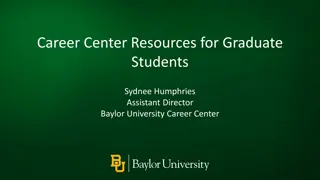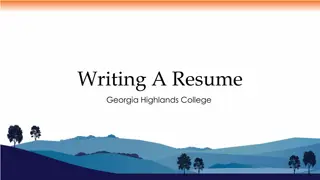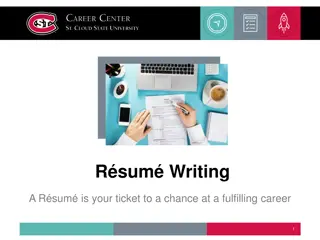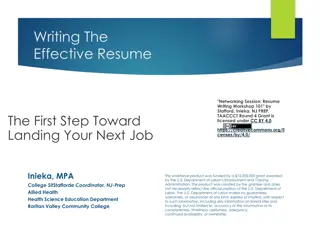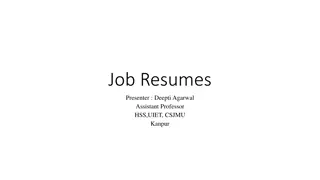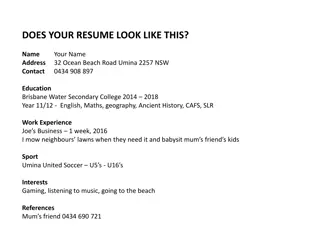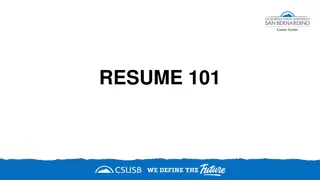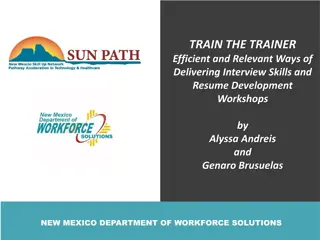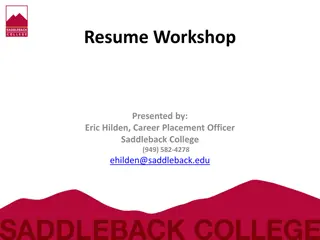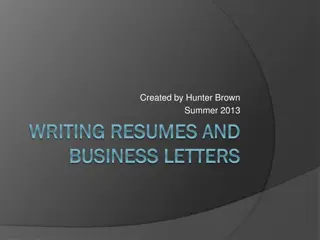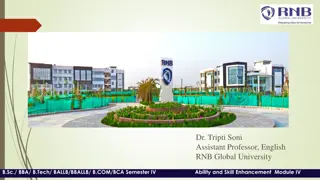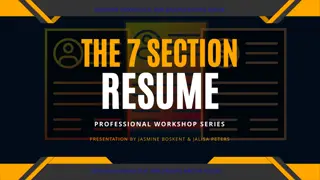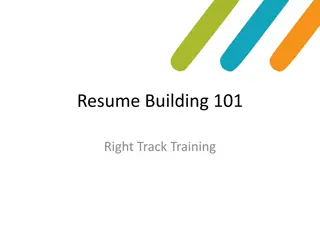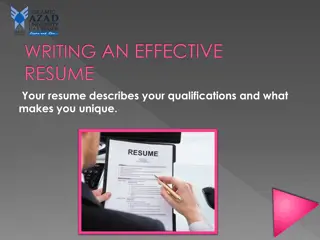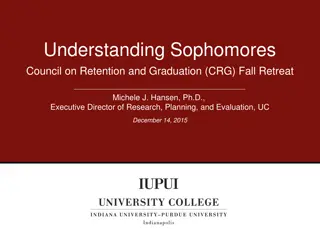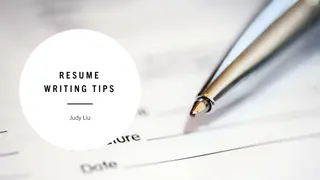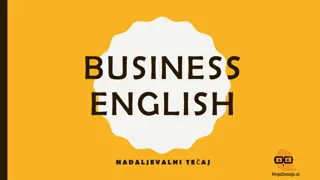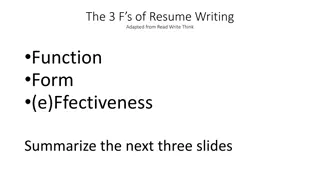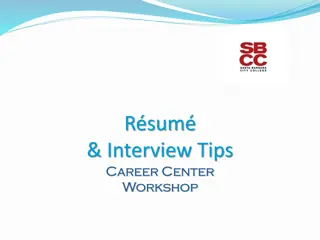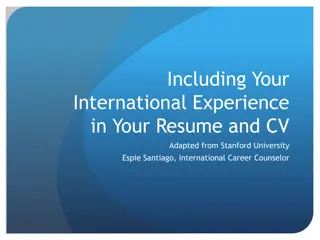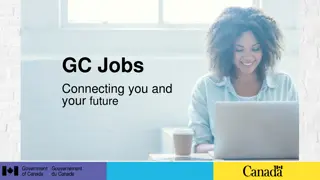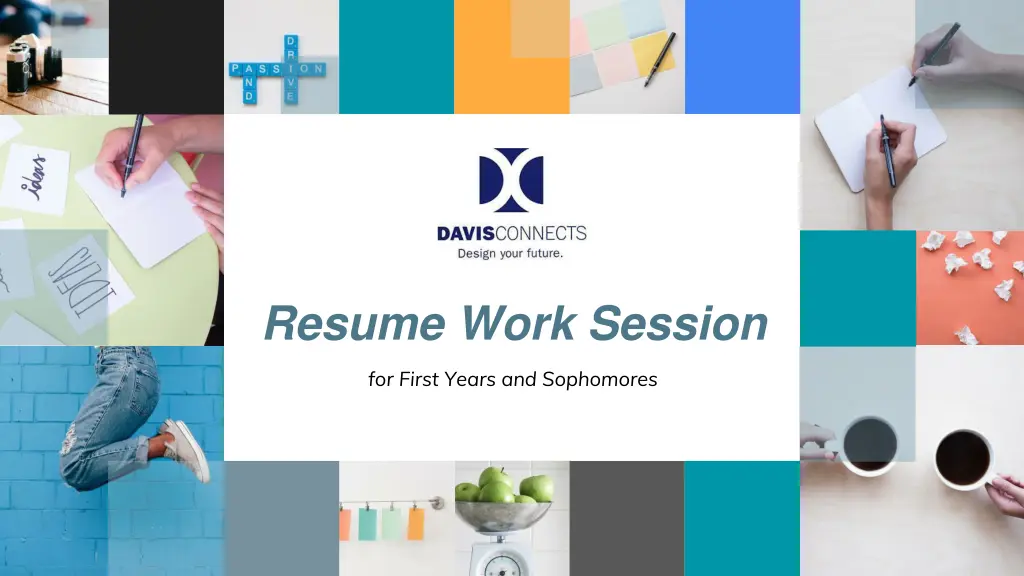
Helpful Tips for Crafting a Strong Resume as a First-Year or Sophomore
Learn valuable insights on creating a one-page resume for scholarship applications, job opportunities, and internships as a first-year or sophomore student. Understand where to start, debunk myths about lacking experience, and get practical guidance on structuring your resume effectively.
Download Presentation

Please find below an Image/Link to download the presentation.
The content on the website is provided AS IS for your information and personal use only. It may not be sold, licensed, or shared on other websites without obtaining consent from the author. If you encounter any issues during the download, it is possible that the publisher has removed the file from their server.
You are allowed to download the files provided on this website for personal or commercial use, subject to the condition that they are used lawfully. All files are the property of their respective owners.
The content on the website is provided AS IS for your information and personal use only. It may not be sold, licensed, or shared on other websites without obtaining consent from the author.
E N D
Presentation Transcript
Resume Work Session for First Years and Sophomores
Why do I need a one-page resume? Scholarship applications Informational interviews or job shadowing On-campus or part-time jobs (e.g., COOT Leader, CA, Research Assistant) Paid or unpaid research opportunities Internship and fellowship applications 2
Q: But where to start? A: The copy of your high school resume you submitted in college applications (if you still have a copy of it!)
Myth #1 I haven t done anything yet. I have nothing to include. FALSE: You have more to say than you think! Here is a short list of what we d expect to see after only your first semester: New contact information New education section reflecting your Colby pursuits Relevant or featured coursework Key skills (e.g., languages, laboratory, certifications) Co-curricular activities or service 4
Start with Contact Details Adjust your contact information to include or highlight the following: your college email address, your linkedin address, and phone number. A physical mailing address is usually optional unless it shows you are the local candidate. LEOS Y. MULES leos.mules@colby.edu EDUCATION Colby College, Waterville, ME 123-456-7890 | Expected 2025 Bachelor of Arts in Anthropology Ash K. Mule ash.mule@colby.edu | 123-456-7890 | linkedin.com/in/ashmule EDUCATION Colby College, Waterville, ME Expected 2024 5
Prioritize Education Update your education section by adding your major, expected graduation date, relevant coursework. Including a GPA is optional. ROBIN MULES ROBIN.MULES@COLBY.EDU 123-456-7890 | EDUCATION Colby College, Waterville, ME Expected June 2024 B.A. in Environmental Studies Relevant Coursework: The Cellular Basis of Life (Biology), Calculus 1 Honors: Bunche Scholar Germaine High School, Germaine, OK May 2020 6 Honors: Summa Cum Laude
Include Technical Skills, if relevant Technical fields, like STEM or tech, expect to see a technical skills section. Signal your level of skill, such as basic, intermediate, proficient, or fluent, in parenthesis. SKILLS Lab: Filtration, Sterilization, Pipetting Data Analysis: Excel, SQL Language: Spanish (basic) Certification: Basic Life Support In many cases, soft skills, like strong communication or organizational skills, should be incorporated in your activity descriptions throughout your resume. 7
Myth #2 Once I start college, I cannot include any of my high school experiences. FALSE: As a first-year or sophomore student, it is appropriate to feature some of your high school experience on your college resume. You are just beginning to build your college experiences. You will be able to replace your high school experiences as you build on those experiences in the next year or so. 8
Complete Activity Descriptions Don t worry about whether you were paid; include jobs, volunteer work, and athletic, academic, performance, professional or social activities. List your most recent/current experience first and organize by end date. Include quantifiable information like time spent or number of people involved. Describe the scope and pace of the work and your level of responsibility. Convey what you accomplished and the results of your efforts. Start bullet points with action verbs. Use past tense action verbs for experiences that have ended. Community Advisor, Colby College Hall Staff, Waterville, Maine 2021 Present Maintain a positive and inclusive living environment for 200 residents in Alfond Commons. Planning and executing three events with the Office of Civic Engagement, Faculty-in- Residence Program, local businesses, and community partners to encourage student involvement in our community. 9
Organize Activities by Categories Leadership Research Community Engagement Performances Experiences Publications Activities Volunteering 10
Myth #3 Since I ve never had experience in this internship field, I have no experience to offer recruiters! FALSE: You have gained skills and knowledge in other roles that transfer to this one. Focus on what communication, teamwork, problem-solving, leadership, and other skills you have developed in other roles and experiences. Note where and how those skills were developed and incorporate those insights in how you describe the activities included on your resume. 11
Focus on Portable Soft Skills Communication: writing clearly and concisely, using media to present ideas, reporting information, public speaking, making presentations, providing accurate descriptions Leadership: generating ideas, managing others, delegating responsibility, promoting and adapting to change, prioritizing tasks, identifying areas for improvement, facilitating group discussions, mentoring Teamwork: eliciting input and providing feedback, developing rapport, sharing credit, collaborating, making decisions with others Research: forecasting, designing an experiment, imagining alternatives, defining needs, extracting important information, developing strategies, analyzing information, presenting findings Problem-Solving: defining problems and possible causes, developing plans to implement solutions, mediating problems, identifying and selecting solutions, teaching/training others, prioritizing/balancing resources Organization: managing time, setting and meeting deadlines, enlisting help, taking initiative 12
Put together... Remember: Keep it to one page! 13
Resources Colby Resume Guide w/ Samples (in Handshake) Colby Cover Letter Guide & Samples (in Handshake) Colby Resume Template (in Handshake) DavisConnects YouTube Channel 14
DavisConnects Fellow Drop-Ins After you ve worked on your resume draft, drop by the DavisConnects Fellow Drop-In Advising Hours to receive feedback from older peers! (See listed hours in Handshake or Moodle.) 15

